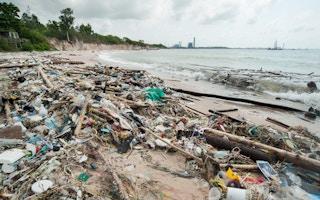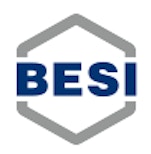The world’s oceans are awash with plastic, and Southeast Asia is a major culprit.
In a 2015 report, the non-profit Ocean Conservancy noted that 55 to 60 percent of plastic waste entering the oceans comes from just five countries, including four in the region: China, Indonesia, the Philippines, Thailand and Vietnam. The debris kills marine life and breaks down into microparticles that make their way into seafood eaten by humans. Last year, plastic was found in human faeces.
In recent years, Southeast Asian nations have acknowledged their role in the pollution and pledged to curtail it. In 2018, Malaysia announced that it will eliminate single-use plastic by 2030 and published a roadmap towards achieving the goal. Indonesia, the world’s second largest marine plastic polluter after China, has said that it will spend up to US$1 billion per year to reduce its marine waste by 70 per cent between 2017 and 2025.
In June 2019, the Association of Southeast Asian Nations (Asean) promised in a joint declaration that its members will take concrete actions and help one another to “prevent and significantly reduce marine debris”, including plastic waste, for example through the possible development of an East Asia regional plan of action and guidelines. Environmentalists have called on the bloc to do more.
Sumangali Krishnan, chief business officer for consultancy GA Circular, which is devoted to finding business opportunities in post-consumer waste in Asia, said that creating ambitious national targets will help to align local policies. Still, other stakeholders must play their part. “We need investments in infrastructure to collect and recycle waste, but we also need behavioural change and industry-led efforts too,” she said.
Harnessing the private sector
She pointed to Packaging Recycling Organisation Vietnam, an alliance of nine leading firms in the country, including Coca-Cola Vietnam, Nestlé Vietnam and Tetra Pak Vietnam, that was founded in June 2019 to encourage collaborations to reduce packaging waste, which often ends up in the ocean. The firms are supported by GA Circular and have committed to collecting and recycling all of the packaging material that they place on the market by 2030.
“Many companies are being blamed for the amount of packaging waste that they put out, so when a firm showcases the fact that it is doing something about its waste, it reaps benefits for its reputation. Some of the markets that the firms operate in also do not have full-fledged municipal structures to collect and recycle waste, so this is a very strong way for them to intervene and help themselves as well as the environment,” Krishnan said.
In the Philippines, several companies have set up innovative and sustainable systems to pay residents for plastic waste. Plastic Bank, a social enterprise based in Canada, offers people cash, digital currency, healthcare coverage and other rewards for plastic waste, which it then sells to firms to use in manufacturing. Working with local collectors, it now helps them to recover nearly 12,000kg of plastics every month and sell the waste to its partners.
“The only way to stop ocean plastic is to reveal the value in plastic. High rates of poverty, geography and lack of infrastructure all contribute to the ocean plastic crisis. By creating relationships with existing ‘junk shops’, informal collectors and the local government, and by making plastic too valuable to haphazardly throw away, we were able to prove that we could increase collection and improve conditions for collectors,” the enterprise said.
From pollution to power
Another approach to monetising plastics is what the head of United States-based firm Biomass Energy Systems (Besi) describes as “clean reuse”; generating power using all kinds of plastics without needing to separate them for recycling.
Besi specialises in alternative technologies for waste elimination, renewable energy and clean water, builds plants that can use plastics, construction debris, food, textiles and other waste to create air-conditioning, electricity and steam.
The company’s gasification technology can be applied on various scales, for instance to enable factories to manage their waste on-site, or for beach and waterway clean-up operations to prevent plastic from entering the ocean, providing power for local communities at the same time.
“Our technology can be used for all types of waste, either individually or in aggregate, and from modest to appreciable quantities, so it can be easily integrated in all industries to help them use their waste to generate clean fuel gas, steam and electricity. One ton of waste can produce US$120 worth of steam, US$100 worth of diesel or US$66 worth of electricity, among other resources,” said Besi president and chief executive Renee Comly.
“By using our technology, we can shut the waste plastic spigot off at the source, leaving nothing to enter into waterways and the oceans. We make our technology available under licensing agreements, and provide project planning and design, system supply and technical support during installation and operations. We have delivered projects in India, the United States, and South Korea,” she added.
Besi is looking for project developers to work with in Southeast Asia, and also wants to work with the food industry and plastics manufacturers to help them find solutions for waste issues, Comly said.
She noted that the plastic waste crisis in Southeast Asia is an opportunity for the region to become a leader in sustainable waste management. “By instituting new technological alternatives to landfilling and incineration, we can turn the crisis into an enormous win that includes job creation in underserved communities, clean power generation and a competitive edge in industrial capabilities,” she said.
“The situation in the region has focused a spotlight on the practices that caused the problem, and we now have support for change from some of the largest companies on the planet,” she highlighted. “We will need to use these technologies that are sustainable and robust, and that match the skillsets of the local population, to overhaul waste processing globally, to make it environmentally and economically sustainable everywhere, in developing as well as developed nations, and including the islands on the front lines of the environmental crisis.”
Companies like Besi, working with local firms and organisations, could have a prominent role in that transformation. In Indonesia, residents in small towns such as Bangun are already eking a living by sorting and selling plastic waste such as bottles and wrappers to local companies for reuse, while in Cambodia, homegrown recyclers could soon get a boost from larger firms that specialise in turning the waste into wealth.
Japanese firm Gomi Recycle 110, for example, is building two plastics recycling plants in the Phnom Penh Special Economic Zone and Svay Rieng province. The company will buy plastic scraps from local collectors and middlemen, melt them, and use the material to make tables, chairs and construction bricks strong enough to be used for bridges and homes. The firm said it can use all types of plastic waste except polyvinyl chloride (PVC).
Gomi manager Hiroya Kawai underlined the opportunity for both residents and companies like his own in the region. He said of Gomi’s vision in Cambodia: “Something that we are throwing away as waste will be money.”




















